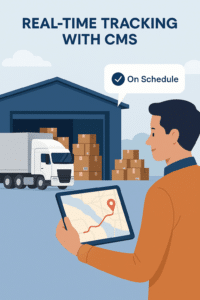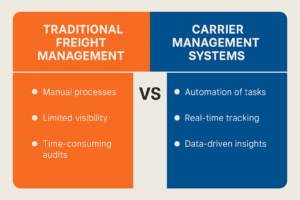If you’re running a business in the United States and finding your shipping costs spiraling out of control, struggling with inconsistent carrier performance, or drowning in freight management complexities—you’re not alone. These common logistics challenges can quickly turn into serious obstacles, impacting your profitability and customer satisfaction. Thankfully, a Carrier Management System (CMS) is the solution many successful businesses swear by, and in this guide, we’ll clearly explain how it works and why it matters.
Quick Guide
- What Exactly is a Carrier Management System?
- Why Does Your Business Need a CMS?
- Key Features of an Effective CMS
- How to Choose the Right Carrier Management System
- CMS vs. Traditional Freight Management: Which Wins?
- Frequently Asked Questions
What Exactly is a Carrier Management System?
A Carrier Management System (CMS) is software designed to help businesses effectively manage their relationships with freight carriers. As part of a broader Transportation Management System (TMS), CMS specifically:
→ Tracks each shipment in real-time.
→ Benchmarks carrier performance against predefined commitments.
→ Provides actionable insights and comprehensive reports on logistics performance.
This approach transforms your logistics management from reactive guesswork into proactive strategy, improving overall efficiency and significantly reducing costs.
Why Does Your Business Need a CMS?
If your business has experienced:
- Unexpectedly high shipping costs
- Persistent billing errors and discrepancies
- Poor visibility of shipment statuses
- Difficulty assessing carrier reliability
Then integrating carrier management software is essential. At The FSL Group, we’ve consistently helped small to midsize businesses overcome these exact hurdles, streamlining their logistics with comprehensive carrier management services and allowing them to focus on core business operations.
Key Features of an Effective CMS
An effective Carrier Management System includes:
- Real-time shipment tracking: Optimizing freight logistics with real-time tracking ensures timely deliveries.
- Performance benchmarking: Easily identify carriers meeting or falling short of service agreements.
- Detailed reporting and analytics: Turn complex data into simple, actionable insights by leveraging our Supply Chain Analytics Consulting.
- Integration capabilities: Effortlessly work within your existing TMS for seamless logistics management.
Leveraging these carrier management solutions allows businesses to reduce costs, increase efficiency, and enhance customer satisfaction.
How to Choose the Right Carrier Management System
Selecting the right CMS for your business involves evaluating:
- Ease of use: User-friendly interfaces help your team adopt the system faster.
- Customization: Choose solutions tailored to your business-specific logistics needs.
- Support and service: Ongoing support ensures smooth operations and quick problem-solving.
- Integration: Ensure seamless integration with your existing freight brokerage services and business software.
At The FSL Group, we believe in solutions tailored to your unique needs—because your logistics should fit your business, not the other way around.
CMS vs. Traditional Freight Management: Which Wins?
While traditional freight management often relies on manual processes that are prone to errors and inefficiencies, a CMS offers automation, real-time visibility, and robust analytics. The result?
→ Reduced human errors and inaccuracies.
→ Proactive rather than reactive logistics management.
→ Significant long-term cost savings.
Learn how to avoid costly LTL shipping mistakes and further improve your operations.
Frequently Asked Questions
What’s the difference between a CMS and a TMS?
A TMS is broader software managing the entirety of logistics operations. A CMS specifically focuses on carrier relationships, performance tracking, and shipment visibility within a TMS.
Can small businesses benefit from a CMS?
Absolutely. CMS helps businesses of all sizes streamline carrier management, reduce unnecessary costs, and increase logistics visibility and efficiency.
Is implementing a CMS expensive?
While there’s an initial investment, a CMS typically pays for itself quickly through significant cost savings and improved operational efficiency.
How long does it take to see results from a CMS?
Most businesses notice improvements almost immediately, with significant measurable benefits within weeks to a few months.
Streamline Your Logistics with Carrier Management
A Carrier Management System is more than just software—it’s a strategic solution designed to significantly reduce logistics complexity, lower operational costs, and boost business efficiency. By leveraging advanced carrier management services and robust carrier management solutions, you can transform your logistics from a cost center into a competitive advantage.
Ready to optimize your shipping strategy? Contact The FSL Group or Discover Our Carrier Management Services and start experiencing the benefits today.




